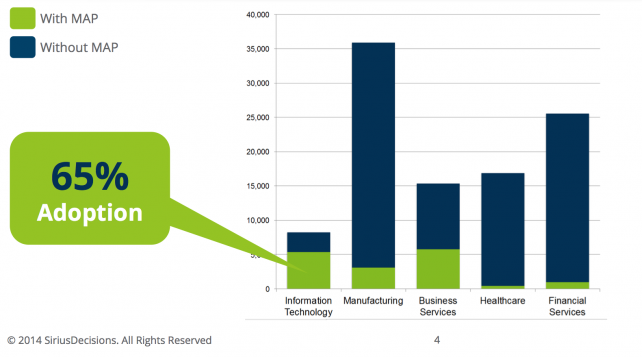For too long, marketers have been overly dependent on IT to assist with their campaigns. Often, this is a slow process; requests for data dumps can be slow to appear. For many years, data has been locked down so tightly that there was no other option for marketers.
But the task of compiling and using data is becoming increasingly devolved. This is part of a wider shift in the way we think about data, bringing it out of the server room and funneling it through tools that every department can access.
Increased sharing of data requires high quality data that is free from errors and out of date information.
Data in a database decays at a rate of 2 per cent per month. Up to 96 per cent of your database is currently out of date. Clearly, action needs to be taken on a consistent and long-term basis. The 2016 MarTech Data Report found that data quality is a problem for 49 per cent of its 400 respondents. Simultaneously, 51 per cent of respondents said missing information was a problem.
Marketing automation offers great opportunities, but we all have groundwork to do first.
Automation assists businesses in having real time conversations with the people most likely to spend. In an era of increased social engagement, two-way dialogue is a critical part of positioning your brand as being open and willing to engage. It certainly helps if those conversations can take place instantly, without being a crippling burden on your resources.
Customers are also using increasingly diverse channels, and automation helps businesses claim those channels and have conversations that span more than one. Thanks to better tracking and analytics, marketers can know where their efforts would achieve best results, without waiting for the IT department to turn around reports on KPIs.
By 2020, Gartner says that customers will manage 85 per cent of their relationships with suppliers without ever talking to a person. Where there is less human effort, there are also lower costs, and a better use of data that the business already holds.
Lead scoring, nurturing and segmentation also help boost efficiencies, passing these considerable resource savings to both marketing and sales departments. Marketing automation lets us see more granular segments and clearer signposts to engaging with prospects.
In 2016, it’s not a question of whether you’ll adopt marketing automation, but which platform you should choose, and why. There are two key elements that a marketing automation platform must support:
There are dozens of options on the market, and not all of them are comparable. Some serve enterprise well, but others are SME focused. Examine the solutions you already have, and the ecosystem that will best work for your business.
Marketing automation is pushing new boundaries in a new digital landscape. Software is delivering new features, opening up data that was previously difficult to access. Automation lets you respond quickly, adapt instantly, and tailor your approach depending on response.
One thing is for certain: automation drives an increase in marketing qualified leads (MQLs). This is proven in several studies. 80 per cent of marketing automation system users saw an increase in leads, and 65 per cent say leads increased by at least 10 per cent. According to SiriusDecisions, marketing automation adoption is increasing at a rate of 22 per cent; given the opportunities, it’s hardly surprising.

Position² is a Marketo Certified Partner, and our team already has over 4 years’ experience in the platform. Contact us for more information about our Marketo consultancy services. We have a booth at the forthcoming Marketo Marketing Summit 2016; stay tuned for more details about the event.